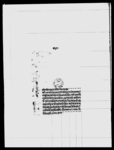A rukkā from King Rājendra ordering Kapardāra Garuḍadhvaja Pāḍe to settle tenants in Lubhu village (VS 1881)
ID: DNA_0014_0024
Edited and
translated by Surabhi Pudasaini
in collaboration with
Rabi Acharya
Created: 2022-07-21;
Last modified: 2023-03-07
For the metadata of the document, click here
The accompanying edition, translation/synopsis and/or commentary are available under the terms of the Creative Commons Attribution-ShareAlike 4.0 International License
Abstract
This rukkā from the king, who must have been Rājendra based on the date of issue, directs Kapardāra Garuḍadhvaja Pāḍe to push back the walls of Lubhu village and settle tenants on raikara land.Diplomatic edition
[1r]
1श्रीदुर्गा\[Royal seal]1स्वस्तिश्रीमन्महाराजाधिराजकस्यरुक्का¯ ¯ ¯ ¯ ¯ ¯2आगे∙कपर्दारगरुडध्वजपाडेप्रतिलुभुगाउमावश्नआउ
3न्याकुरियालाईताहागाउकाभलामानीस∙रअडैप्रधानचौ
4धदुव़ालराषिगाउकापर्षाल२५हातपरसारि∙वृत्ताकम्प
5नी∙गुठिप्रजाकोसुनाजगावाहिक∙रैकरभित्रचारैपट्टि
6जाहाराजीहुंछपरापूर्वकारीतसित∙आउन्याप्रजाला
7ईवसनदिनुगाउगुल्जारगर्नुरस्तिचलाईवस्तिवसाउ
8नुभनिवन्देजवाधिवक्स्यौँ∙इतिसम्वत१८८१साल∙मि
9तिपौषशुदि२रोज४शुभम्¯¯¯ ¯¯¯ ¯¯¯ ¯¯¯ ¯¯¯ ¯¯¯ ¯¯¯ ¯¯¯
[1v]
1⟪(४१)⟫1⟪४४५⟫1मार्फत्उदयगिरि1मार्फत्भीमसेनथापाTranslation
[1r]
Śrī Durgā!
[Royal seal]
Hail! [This is] an executive order (rukkā) of the supreme king of great kings.1
Āge: To KapardāraGaruḍadvaja Pāḍe
For the kuriyās who come to live in Lubhu village, assemble the respectable men (bhalā mānisa) and the aḍai, pradhāna, chaudha (for caudhari?), duvāla of that village, move back the village wall 25 hātas, except for birtā, kampanī and guṭhi [land], and the sunā[birtā]s of the prajās, let prajās who come live on raikara [land] in all four directions, wherever there is a willingness [to do so], in accordance with customary practice. We issue a bandeja stating: “Make the village prosperous, oversee affairs and establish settlements.”
Wednesday, the 2nd of the bright fortnight of Pauṣa, in the [Vikrama] era year 1881 (1824 CE). May it be auspicious.
[1v]
[Additions:]
(41)
445
[Signatures:]
Through (mārphata) Udaya Giri
Through Bhīmasena Thāpā
Commentary
This is an order from the king instructing Kapardāra Garuḍadvaja Pāḍe to push back the walls of Lubhu village and settle new tenants. Moving the village walls likely indicated an on-the-ground remarking of the village boundaries. Settling new people was a sensitive communal process. Lands had to be remeasured. Ownership, tenancy, and use rights had to be confirmed. Myriad local stakeholders had to sign off on the process. Barring specific categories of land, tenants were allowed to settle where they chose within the newly enlarged settlement limits. This order was issued three years after Garuḍadvaja Pāḍe was ordered to restart the stalled annual pajanī of tenant farmers (mohī) in the lands comprising the Lubhu serā (DNA_0014_0048). The two events are perhaps, but not necessarily, related with new people brought in to provide additional labour for the serā lands.

